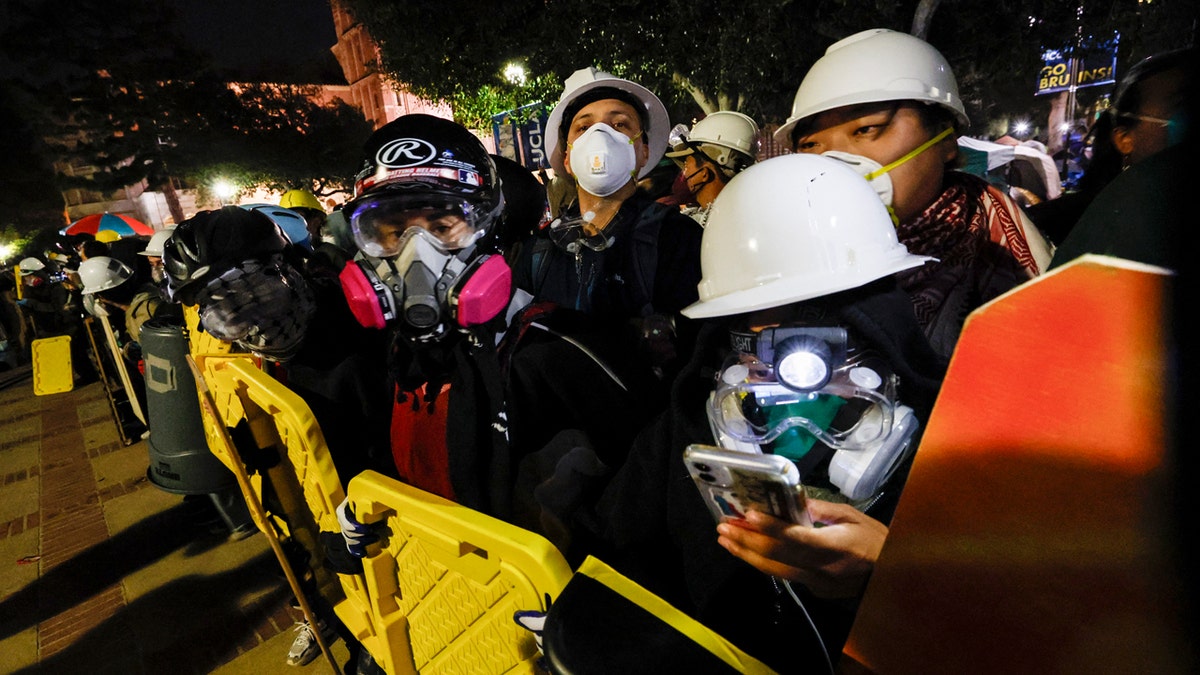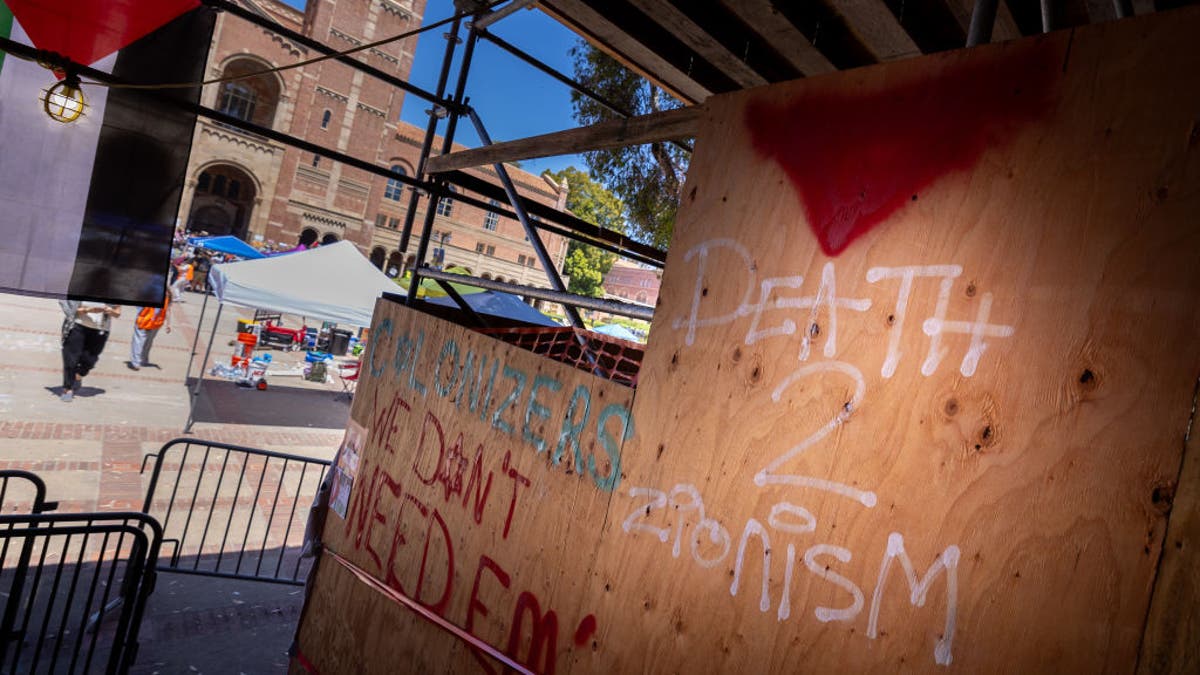West
Jewish students file lawsuit against UCLA over anti-Israel encampment on campus

Three Jewish students filed a civil rights lawsuit against the University of California Board of Regents and university officials, claiming UCLA allowed “antisemitic activists” to prevent Jewish students from walking to classes, offices and the library on campus during anti-Israel demonstrations in April and May.
Two law students and an undergraduate student allege that UCLA allowed a group of students and outside demonstrators to set up an encampment, and that these demonstrators prevented Jewish students and faculty from accessing the heart of campus, according to the complaint.
This comes amid the ongoing war in the Middle East between Hamas terrorists and Israeli forces, which stems from Hamas’ Oct. 7 attacks against Israel that led to a retaliatory military response from Israel.
Since Oct. 7, anti-Israel demonstrations have been observed on college campuses across the U.S. and around the world. Other lawsuits have been filed over the campus protests by students claiming their universities failed to keep campuses safe. Schools facing lawsuits include Rutgers University and Columbia University, which this week settled with a Jewish student who brought a lawsuit against the university over an “unsafe educational environment.”
COLLEGES HIT WITH LAWSUITS OVER HANDLING OF ANTI-ISRAEL CAMPUS PROTESTS
Hundreds of students protest outside the Palestine Solidarity Encampment on the campus of UCLA in Los Angeles on Wednesday, May 1, 2024. (Keith Birmingham/MediaNews Group/Pasadena Star-News via Getty Images)
The complaint against UCLA said the university allowed protesters to set up an encampment that enforced a “Jew Exclusion Zone,” stopping Jewish students and faculty from accessing the encampment and other parts of campus unless they agreed to disavow Israel’s right to exist. The activists used checkpoints, issued wristbands, built barriers and often locked arms to prevent Jewish students and faculty from passing through.
UCLA’s administration was aware of this for a week without taking action, according to the complaint, which also said UCLA instructed security staff to discourage unapproved students from attempting to cross through the areas blocked by the activists instead of clearing the encampment.
“If masked agitators had excluded any other marginalized group at UCLA, Governor Newsom rightly would have sent in the National Guard immediately,” said Mark Rienzi, president and CEO of Becket, which filed the lawsuit on behalf of the three Jewish students. “But UCLA instead caved to the antisemitic activists and allowed its Jewish students to be segregated from the heart of their own campus. That is a profound and illegal failure of leadership.”
“This is America in 2024—not Germany in 1939. It is disgusting that an elite American university would let itself devolve into a hotbed of antisemitism,” Rienzi continued. “UCLA’s administration should have to answer for allowing the Jew Exclusion Zone and promise that Jews will never again be segregated on campus.”

Since Oct. 7, anti-Jewish demonstrations have been observed on college campuses across the U.S. and around the world. (Photo by ETIENNE LAURENT/AFP via Getty Images)
UCLA said in a statement it is aware of the lawsuit and that it will review and respond in due course. The university said it remains committed to supporting the safety and well-being of the entire campus community.
According to the plaintiffs, activists within the encampment “viciously targeted” Jewish students on campus.
Plaintiff Yitzchok Frankel, a law student and father of four, said he faced antisemitic harassment and was forced to abandon his regular routes through campus because of the “Jew Exclusion Zone.”
Demonstrators allegedly repeatedly blocked plaintiff Joshua Ghayoum, a sophomore and history major, from accessing the library and other public spaces, and he claims to have heard chants at the encampment that included “death to Jews.”
UCLA STUDENT TEARS INTO ‘SQUAD’ FOR ‘GLORIFYING’ ANTI-ISRAEL AGITATORS: THEY SHOULD BE ‘ASHAMED’

Graffiti at the Powell Library on the UCLA campus where anti-Israel demonstrators erected an encampment on Monday, April 29, 2024, in Los Angeles, California. (Getty Images)
The third plaintiff, law student Eden Shemuelian, said her final exam studies were severely compromised when she was forced to walk around the encampment and immerse herself in its antisemitic chants and signs to access the law school’s library.
The students are asking the court to ensure that Jews will never again face this kind of treatment on UCLA’s campus.
Police eventually cleared the UCLA encampment and arrested more than 200 people after a delayed law enforcement response.
Read the full article from Here

Alaska
Easiest business class flights to book, United complains about Alaska/Hawaiian and yet another Hyatt acquisition (Saturday Selection)

United complains to the feds about the Alaska/Hawaiian merger, Hyatt buys another boutique brand and the easiest business class flights to actually book. All that and more in this week’s Saturday Selection, our weekly round-up of interesting tidbits from around the interwebs (links to the original articles are embedded in the titles).
United complains to DOT about Alaska/Hawaiian merger
It’s time for this week’s thrilling episode of “As the Merger Turns.” First of all, a quick recap for those folks who haven’t been on pins and needles while following the latest action of the Alaska/Hawaiian merger. Alaska Airlines surprised nearly everyone last year when it announced that it was grossly overpaying for its “off-the-mainland” compatriot, Hawaiian Airlines. While it was a arguably questionable deal for Alaska shareholders, it was very exciting for most of us points and milers. Hawaiian brings a Pacific-Oceania route map and some fresh, widebody 787s that have never before darkened an Alaska hangar, while at the same point providing some potentially exciting ways to load up on roundabout Alaska miles. The DOJ, who hasn’t been a fan of domestic airline mergers over the last few years, spent several months reviewing the transaction, asked for two extensions before finally letting the review period expire without objection. That usually means smooth sailing, so points and miles folks started flocking like Emperor Penguins towards previously ugly ducklings like the Hawaiian credit cards and a transfer bonus from American Express to HawaiianMiles. But, not so fast, my friends. That champion of domestic airline competition and pedigreed consumer advocate, United Airlines, has filed a complaint saying that the merger would violate its own codeshare agreements with Hawaiian, leading to over-consolidation and a negative impact on consumers…an interesting argument from an airline that has an almost 80% market share in Houston International and a 65%+ market share at Newark and Dulles Airports.
So is the merger on or off? Who can say. But, like the Beatles famously sang, “I don’t know why you say aloha when I say aloha.” Or is it the other way around?
The easiest business class flights to book with points

Who doesn’t like international business class? Getting to fly across an ocean or continent in your own bougie little cubby with a seat that doubles as a lie-flat bed is one of the great, obtainable luxuries in modern travel…something that us funny-money hoarders sometimes don’t fully appreciate. That said, it isn’t always easy to find and book space on these pleasure cruises, and seats during school breaks can be like finding cigarettes in prison. Last week, Thrifty Traveler compiled a list of what they consider to be the six easiest business class products to actually seal the deal with when using points and miles (trigger warning – it’s also a bit of an advert for their premium service). Some folks on the East Coast might quibble with the Japan Airlines inclusion, but it’s nonetheless a good rundown on products that tend to have more availability than many others and are worth considering when you’re trying to find a bed in the sky.
Hyatt acquires a small, boutique brand again for the very first time

Hyatt’s been on a bit of an acquisition bender of late. In the last year or so, World of Hyatt has picked-up the boutiqu-y marketing consortium Mr & Mrs Smith (MMS), Germany’s me and all Hotels, and the high-end “glampground” company, Under Canvas. Now, Hyatt is diving even further into the depths of chic, hipster lodging by purchasing the international chain Standard Hotels. Standard is a far-flung company, to say the least. It only has 24 properties, but they’re scattered to the winds, with locations in Australia, Thailand, Singapore, China, The Maldives, Ibiza, London, Mexico and the US. Hyatt describes Standard as being part of an eventual “lifestyle” division that includes other “lifestyle brands” like Andaz, Dream, Thompson, and Hyatt Centric. One wonders how many “lifestyle” brands a company needs to feel well-centered…or even what a “lifestyle brand” is. Regardless, ever since the addition of Mr & Mrs Smith, we hold our breath a little when we see a new Hyatt purchase, waiting to see if these will be a part of the company’s very good-value award chart or the poor-value, dynamically-priced awards that MMS subjects us to (and that’s also shared by Under Canvas). We reached out to Hyatt to see what the pricing would look like on these properties and are still listening to the crickets in the backyard. Hopefully, that’s not an omen of dynamic pricing to come.
Points, miles, FOMO and lifestyle inflation

For points and miles collectors (and spenders), it’s easy for our eyes to be bigger than our stomachs. Ideally, this “hobby” that we’re all involved in is something fun and rewarding, adding rich experience to our families and lives. But, it can be a compulsion as well. The combination of social media and fear of missing out (FOMO) can quickly draw people into spending more time, money and effort than they intend to in pursuit of “maximizing” all those rewards floating around out there. A couple of years ago, I wrote a post about how points and miles should serve our lives and the way we travel, not the other way around. Last week, Leana over at Miles for Family wrote an interesting post in a similar-ish vein about her “…struggle to not let miles and points derail our financial future.” She paints the picture of someone who gets in the “game” looking for points to help take a family vacation to Florida and ends up manufacturing spend in pursuit of vacations to the Maldives and first class flights…that they may never take. It’s a worthwhile weekend read and something to consider for anyone who reads points and miles blogs on the weekend, like me.
Want to learn more about miles and points? Subscribe to email updates or check out our podcast on your favorite podcast platform.
Arizona
Arizona Basketball Reportedly Has ‘Moved On’ From Recruitment of Top 20 Player

While all eyes in Tucson are on the Arizona Wildcats getting their football season underway, basketball is slowly starting to get things in motion.
Two scrimmage dates have been announced for fans to get their first look at this year’s team, with one being held on their home floor and the other being played in Glendale.
Expectations are high for the Wildcats to hit the ground running during their first season in the Big 12 Conference, and with the way this program has performed under head coach Tommy Lloyd, that should be of little surprise to anyone.
In the three years since he’s taken over, Arizona has won two Pac-12 regular season titles and two Pac-12 tournaments, earning a top two seed in the NCAA Tournament every year.
But despite that success, they have topped out on the national stage by being unable to advance past the Sweet 16 round.
Solving that riddle will be the key for Lloyd during his time in Tucson, and by being inserted into a more competitive conference, it will be more difficult for them to maintain a stranglehold on the regular season.
So how can Arizona emerge as true national powers again?
They need to start recruiting at a much higher level than they have under Lloyd.
His first full cycle in charge was the 2022 class, and since that time, the Wildcats have failed to secure a ranking in the top 15.
There are signs this is changing since they finished with the 16th overall class last year, but only landing two four-star recruits makes it tough to maintain long-term success when they have to rely on the transfer portal.
Seemingly knowing that, Lloyd and his staff are attacking the recruiting trail by trying to land some of the best players in the 2025 class.
With visits set up for the fall, the Wildcats are poised to make a huge splash this year.
However, there is at least one recruit in this cycle Arizona had interest in who they are moving on from.
When referencing Tounde Yessoufou, Joe Tipton of On3 reports, “Arizona has moved on from his recruitment and will look to fill the small forward position elsewhere.”
The California native is ranked as the No. 19 player in this class and has garned national interest from some of the top programs around the country like Kentucky, Baylor, UCLA, Tennessee, Kansas, and UConn.
The 6-foot-5, four-star forward has taken two trips to see Arizona, including an official visit back on June 16.
But clearly they feel like their attention is better served elsewhere, whether that’s because the interest has waned from a singular party, or if both are more interest in other options.
Still, this cycle will be one to closely monitor for the Lloyd and the Wildcats as they look to secure their best recruiting class in this era.
California
Some artificial dyes could be banned from California schools

Psychologist provides simple tips to manage ADHD and symptoms
Dr. Ali Mattu explains how efforts like making checklists or being physically active can help manage ADHD.
California public schools could soon be banned from serving certain artificial dyes in food over concerns about developmental harm in children.
Dubbed a “first-in-the-nation” measure, state lawmakers this week passed Assembly Bill 2316 to prohibit six additives that are permitted by federal regulators to make food more colorful. California’s AB 2316, known as the California School Food Safety Act, is now on Gov. Gavin Newsom’s desk.
The bill says state research suggests such synthetic dyes can result in hyperactivity and other behavioral problems. Similar previous research prompted the European Union to restrict food coloring. Nearly all of the products that the California bill would ban in schools require warning labels in E.U. products.
The bill would ban commercial dyes of Blue 1, Blue 2, Green 3, Red 40, Yellow 5 and Yellow 6, in public schools in the nation’s largest state.
“California has a responsibility to protect our students from chemicals that harm children and interfere with their ability to learn,” state Assemblymember Jesse Gabriel, a Democrat who authored the bill, said in a statement. He said that he struggled with Attention Deficit/Hyperactivity Disorder, or ADHD, and he is now a parent.
On Saturday, a spokesperson said Newsom’s office didn’t comment on pending legislation. The deadline for Newsom to sign or veto legislation is Sept. 30, the spokesperson said.
The nonprofit Environmental Working Group and the California Medical Association, which represents doctors, supported the bill.
The U.S. Food and Drug Administration approvals for the dyes banned under AB 2316 date back decades, the environmental nonprofit said. Those approvals were based on old studies not designed to detect behavioral effects in children, the medical association had said in its support of AB 2316.
The Consumer Brands Association, a dye industry representative, opposed the bill because it overrode existing food safety rules, and the group disputed findings about adverse health effects. John Hewlitt, the association’s senior vice president of packaging, sustainability and state affairs, said the bill was “advancing a political agenda.”
“The passage of this bill could cost schools and families money, limit choice and access, and create consumer confusion,” he said in a statement provided to USA TODAY. “The approach taken by California politicians flies in the face of our science and risk-based process and is not the precedent we should be setting when it comes to feeding our families.”
A 2021 state Environmental Protection Agency assessment found American youth diagnosed with ADHD increased in the last 20 years, which prompted the state to look at food dyes. The U.S. Centers for Disease Control and Prevention has similarly tracked increases in ADHD diagnoses in children in recent years.
Focusing on seven food dyes, including those that would be banned under AB 2316, state researchers reviewed prior studies on the effects of these dyes in humans and laboratory animals. Findings indicated they were linked to adverse neurobehavioral outcomes in children, and children varied in sensitivity.
On Friday, an FDA spokesperson told NBC News they had reviewed literature cited in California’s legislation. While saying most children have no “adverse effects” when they eat foods with color additives, the spokesperson reportedly said some evidence suggests certain children may be sensitive.
If signed into law, California’s ban would take effect in schools beginning in 2027.
-

 Connecticut1 week ago
Connecticut1 week agoOxford church provides sanctuary during Sunday's damaging storm
-

 Technology1 week ago
Technology1 week agoBreakthrough robo-glove gives you superhuman grip
-

 Politics1 week ago
Politics1 week agoClinton lauds Biden as modern-day George Washington and president who 'healed our sick' in DNC speech
-

 Politics1 week ago
Politics1 week ago2024 showdown: What happens next in the Kamala Harris-Donald Trump face-off
-

 News1 week ago
News1 week agoWho Are Kamala Harris’s 1.5 Million New Donors?
-

 Politics1 week ago
Politics1 week agoTrump taunted over speculated RFK Jr endorsement: 'Weird as hell'
-

 Politics1 week ago
Politics1 week agoVivek Ramaswamy sounds off on potential RFK Jr. role in a Trump administration
-

 World6 days ago
World6 days agoPortugal coast hit by 5.3 magnitude earthquake














